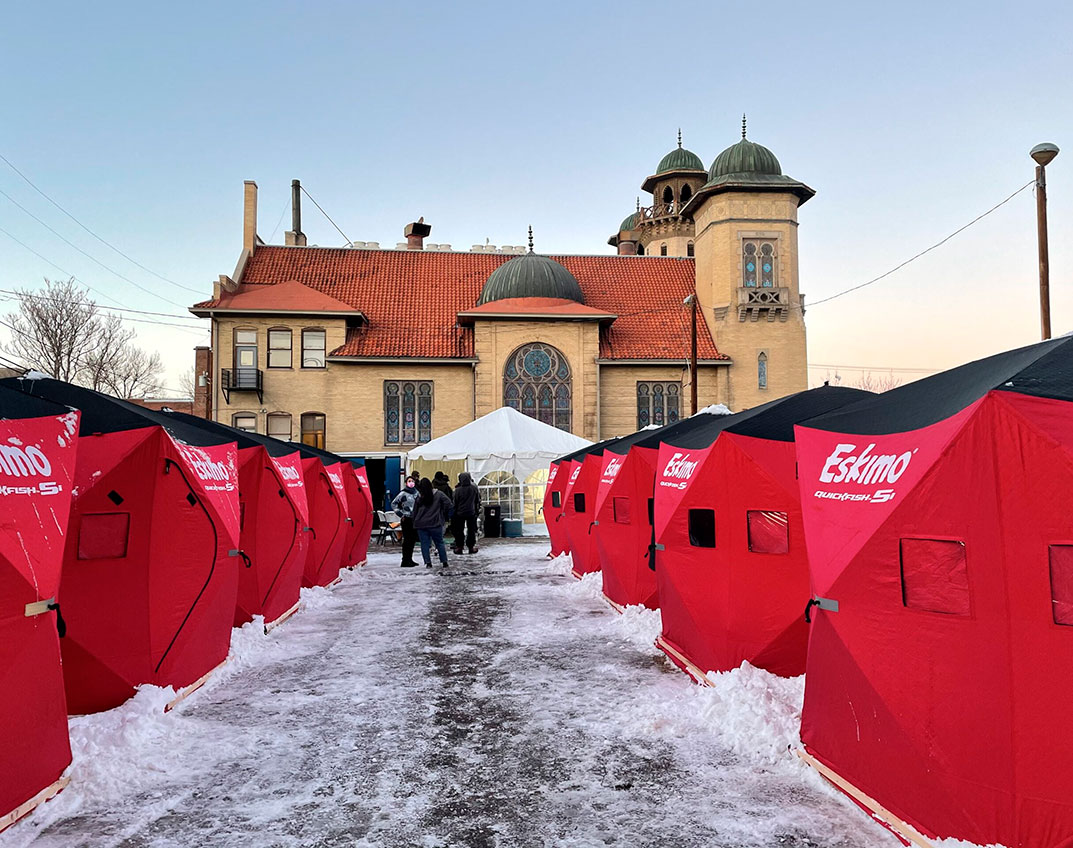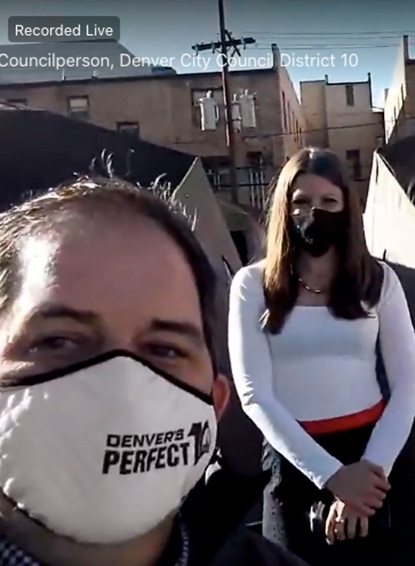District 10 & Homelessness
I believe that all individuals have a right to safe and affordable housing. However, over 9,000 people in the Denver Metro region currently live without homes. To address this crisis, the city must work efficiently and creatively to ensure access to housing and safe and clean neighborhoods for all residents.
Nowhere are these challenges more present than in District 10. As the center city district, we host the neighborhoods with the highest number of homelessness service providers, largest percentage of renters, and highest rents.
D10 residents struggling with housing issues can use the City of Denver’s Resident Resources pages for help, and report issues using Pocketgov.
Additionally, the D10 office can connect you with:
- Rental assistance/ eviction defense programs
- Public Health and Environment inspectors who can investigate habitability issues
- Information on affordable housing providers
- Assistance with neighborhood problems/ city services
- Mediation services to manage disputes between tenants or property management
Email district10@denvergov.org for assistance.
Denver’s State of Homelessness
Denver has seen a 31% increase in homelessness in the past year alone. This jump is even more startling in our unsheltered, unhoused population, which has seen an increase from 6,104 to 6,884 in the point in time count in just one year. These numbers were more pronounced in Denver’s unsheltered unhoused population, which saw an increase of more than 50% in recent years.
Homelessness is not a monolith, and there is no single cause that lead people to become unhoused. However, housing unaffordability remains one of the main reasons that people become homelessness. For example, the average rent in Denver for a two bedroom apartment is $1800, where more than 87% of renters in Denver make less than $35,000 a year. Denver also ranks second in the nation as the most gentrified city, and Colorado has the 9th highest housing wage of any state.


Myths and Misconceptions about Homelessness in Denver
- Getting rid of public camping will solve our homelessness crisis
- a. Only about a third of Denver’s unhoused population are unsheltered. The rest are staying with family or friends, living out of their car, or staying in temporary shelter. In order to effectively respond to our homelessness crisis, we must develop solutions that address root causes, not just visible homelessness.
- Homelessness is a lifestyle choice
- a. Many believe that people experiencing homelessness choose to be homeless. While there are reasons unhoused people choose to avoid congregate shelters (such as restrictions on pets, partners, and environments that can be difficult for people experiencing trauma) our unhoused neighbors overwhelmingly want to be in housing. Of the 1034 unsheltered people offered shelter in Denver in 2023, only 26 (or 2.5%) exited shelter.
- Unhoused people are moving to Denver from out of state for our city’s support system.
- a. Over 87% of people experiencing homelessness in the Denver metro region are from Colorado. The increases we have seen in homelessness indicate a need for more support from local government.
What is Denver doing about Homelessness?
Housing First:
I believe in using a Housing First approach to eliminate homelessness in Denver.
What is Housing First:
While approaches may vary, housing first models to addressing homelessness all posit that direct access to affordable and permanent housing are the foundation to successful housing programs. While connections to jobs, mental health services, and integrated services all play a vital role in supporting people transitioning out of homelessness, housing stability is essential to ensure the long term success of other elements of the program.
A wealth of studies show that Housing First models are the most effective way to address homelessness. Not only do drastically more people stay housed using a housing first model (~88% compared to around 50% in national studies), but it can also be more cost effective. Every dollar invested in housing first solutions saves around $1.44.
Department of Housing Stability
In 2019, the city of Denver created the Department of Housing Stability (HOST) to invest resources, create policy, and partner with community organizations to address the city’s housing crisis. Among other services, HOST can:
- Connect those at risk of losing their housing to resources
- Support people in crisis by connecting them to shelter services, short term, and long term housing
- Create additional affordable housing
- Protect existing affordable housing
In 2024, HOST intends to accomplish the following:
- Bring an additional 1,000 people out of unsheltered homelessness through the House1000 Initiative;
- Serve more than 3,500 households experiencing homelessness in rehousing and supportive housing programs;
- Create and preserve 1,765 affordable homes through investment in the affordable housing pipeline, and effective implementation of Denver’s Mandatory Affordable Housing Ordinance, contributing toward Denver’s Citywide goal to create and preserve 3,000 affordable units;
- Serve more than 9,300 households in housing stability programs, including providing legal counsel in eviction proceedings for at least 2,000 households annually, and explore possible funding sources for housing stability (e.g., rent and utility assistance, eviction legal defense) to increase levels of support that can be provided on an ongoing basis;
- Update the Affordable Housing Preservation Ordinance to align with long-term affordability goals and priorities for use of preservation funds;
- Expand the Affordable Housing Review Team (AHRT) to ensure efficient consideration and review of affordable housing projects and reduce permitting times;
- Expand support for the supportive housing pipeline by working with partners to maximize the effectiveness of housing choice vouchers, including city funded project based vouchers;
- Prioritize language access and culturally appropriate messaging;
- Develop and implement engagement strategies that go beyond City Council and Registered Neighborhood Organizations, and focuses on two-way communication with more intentional listening in coordination with Citywide outreach and engagement efforts; and
- Utilize the new affordable housing search website and database to complete implementation of the Prioritization Program.
You can learn more about the services HOST provides here: https://www.denvergov.org/Government/Agencies-Departments-Offices/Agencies-Departments-Offices-Directory/Department-of-Housing-Stability
House 1000
Mayor Johnston has also made affordable housing a top priority in his administration with the creation of the House1000 program, which aims to house over 1000 unsheltered neighbors before the end of 2023 by partnering with service providers to create micro-communities for people experiencing homelessness throughout the city. You can learn more about the project here: https://www.denvergov.org/Government/Agencies-Departments-Offices/Agencies-Departments-Offices-Directory/Mayors-Office/Programs-and-Initiatives/Homelessness-Initiative
Non Profit Partners
Non-profits are often on the front lines of the homelessness crisis in Denver. I highly recommend learning more and working with the following organizations addressing homelessness in the city.
- Colorado Village Collaborative
- Organizacion Papagayo
- Vive Wellness
- Colorado Coalition for the Homeless
- Servicios de la Raza
- Saint Francis Center
- Denver Rescue Mission
- Urban Peak
… and, if you want more options, Denver has a resource line to hear how you want to contribute and match you with volunteer opportunities. Please visit the official Denver volunteer page.
What is Councilman Hinds doing about homelessness and encampments?
Housing affordability is a top priority for Councilmember Hinds. From the time he sought public office, he has been a strong advocate for local government actions to increase housing affordability/ help prevent homelessness:
Legislatively, CM Hinds has supported successful ordinances and budget amendments that:
- Raise the minimum wage in Denver to $15.00/hour
- Create a “rental registry” that will ensure housing is safe
- Increase funding for temporary rental assistance
- Mandate affordability requirements on some units for new multi-family developments
- Re-zone properties so that they can be used to temporarily shelter unhoused neighbors
Additionally, CM Hinds has advocated with community partners and other city agencies to ensure the success of micro-communities, safe outdoor spaces, and affordable housing projects both in and out of District 10.

I still want to know more!
Councilman Hinds is always interested in hearing from constituents. If you’ve reviewed all of this information and still want to learn more, please feel free to reach out. We know that different people feel comfortable communicating in different ways, so we have a large variety of ways to communicate.